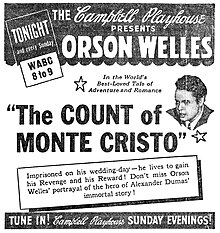Revisiting The Count Of Monte Cristo: A Modern Perspective

Table of Contents
The Enduring Appeal of Revenge
The central narrative of The Count of Monte Cristo revolves around Edmond Dantès's quest for revenge against those who unjustly imprisoned him. This theme of revenge, though often morally ambiguous, possesses an undeniable allure.
The Allure of Justice
The story taps into our primal desire to see justice served, especially when the legal system fails. Edmond Dantès, wrongly accused and imprisoned, becomes a symbol of the wronged individual seeking retribution. This resonates deeply, as many feel a sense of powerlessness against injustice in their own lives.
- Societal Views on Revenge: While societal views on revenge have evolved, the fundamental desire for justice remains. Historically, personal revenge was more accepted; today, legal systems are (ideally) supposed to handle retribution. However, vigilante justice in popular culture indicates an ongoing fascination with the theme.
- Edmond Dantès vs. Modern Vigilantes: Comparing Edmond's calculated revenge with modern-day vigilante actions reveals interesting parallels. While both seek justice outside the law, Edmond's actions, though extreme, are often seen as justified due to the profound injustice he suffered. Modern vigilantes, however, face greater scrutiny, raising ethical questions about their methods and the legality of their actions.
- Ethical Dilemmas: The Count of Monte Cristo doesn't shy away from the ethical complexities of revenge. Is it ever justified? Does it truly bring satisfaction, or does it perpetuate a cycle of violence? These questions remain central to contemporary discussions about justice and morality.
The Psychology of Revenge
Edmond Dantès's transformation from a naive sailor to a cunning and wealthy Count is a compelling study in the human psyche. His years of wrongful imprisonment inflicted deep trauma, shaping his personality and fueling his thirst for revenge.
- The Cycle of Revenge and its Consequences: Edmond’s actions highlight the destructive cycle of revenge. While he achieves his goals, the cost is high, both for himself and those around him. The emotional toll of seeking revenge is evident, suggesting that even successful vengeance may not bring true peace.
- Mental Health Aspects: The novel implicitly explores the psychological impact of trauma and imprisonment on Edmond, touching upon themes now widely recognized as PTSD (Post-Traumatic Stress Disorder). The mental health of both the victim (Edmond) and the perpetrators is a crucial, albeit often overlooked, aspect of the revenge narrative.
Themes of Social Injustice and Class Inequality
The Count of Monte Cristo is not merely a tale of revenge; it's also a sharp critique of social injustice and class inequality prevalent in 19th-century France. These themes continue to resonate powerfully today.
The French Aristocracy and its Downfall
Dumas masterfully depicts the rigid social hierarchy of 19th-century France, exposing the corruption and abuse of power within the aristocracy. The downfall of the characters who wronged Edmond serves as a potent symbol of the fragility of power structures built on injustice.
- Class Disparities: The stark contrast between the impoverished Dantès and the wealthy elite highlights the deep-seated inequalities of the time. These inequalities mirror modern struggles with wealth disparities and the challenges faced by those from lower socioeconomic backgrounds in achieving social mobility.
- Parallels to Modern Issues: The novel's portrayal of social stratification resonates with contemporary issues of wealth inequality and the systemic barriers that prevent social mobility. The struggle for economic and social justice remains a central theme in today's world, reflecting the enduring relevance of Dumas's critique.
Corruption and Abuse of Power
The novel exposes the rampant corruption within various institutions, from the judicial system to the political sphere. The characters who conspire against Edmond represent the abuse of power and the consequences of unchecked ambition.
- Examples of Corruption in the Novel: The false accusations against Edmond, the manipulation of legal proceedings, and the use of power for personal gain are just a few examples of the deep-seated corruption depicted in the novel.
- Modern Parallels: These examples find parallels in contemporary society, where corruption within governments, corporations, and other powerful institutions continues to undermine trust and fairness. The ongoing fight against corruption reflects the continued relevance of The Count of Monte Cristo's central message.
The Count of Monte Cristo in Modern Adaptations
The enduring popularity of The Count of Monte Cristo is evident in its numerous adaptations across various media. These interpretations offer diverse perspectives on the source material, each contributing to its sustained relevance.
Film, Television, and Other Media
From classic film adaptations to modern miniseries, The Count of Monte Cristo has been reimagined countless times, showcasing the story's versatility and adaptability to different formats.
- Adaptations and Key Differences: Numerous film and television adaptations exist, each offering a unique interpretation. Some focus on the revenge aspect, while others emphasize the romantic or social elements. Key differences in plot points and character development demonstrate the story’s capacity for diverse interpretations.
- Audience Reception and Critical Reviews: The varied interpretations have garnered different levels of critical and popular acclaim, illustrating the challenges and rewards of adapting such a rich and complex novel to a different medium.
The Novel's Continued Relevance
The Count of Monte Cristo continues to capture imaginations because its themes transcend historical context. The universal experiences of betrayal, injustice, and the desire for revenge resonate deeply with audiences regardless of time period.
- Ongoing Popularity: The novel’s enduring popularity, evidenced by continued sales and renewed interest, testifies to its timeless appeal. Its themes remain as relevant today as they were when it was first published.
- Themes' Continued Relevance: The core messages of justice, social inequality, and the corrupting influence of power remain central concerns in today's society. This explains why the tale of Edmond Dantès continues to captivate and resonate.
Conclusion
Revisiting The Count of Monte Cristo through a modern lens reveals its enduring power. Its exploration of revenge, justice, social injustice, and the abuse of power continues to resonate with contemporary audiences. The novel’s enduring popularity underscores its timeless themes and its capacity to provoke thought and discussion. We encourage you to revisit The Count of Monte Cristo, whether through rereading the novel, watching a film adaptation, or engaging with scholarly analyses. Explore Edmond Dantès's journey and consider the ongoing relevance of Monte Cristo's revenge in our modern world.

Featured Posts
-
 Ufc Fighter Suspended Six Months For Anti Doping Rule Breach
May 04, 2025
Ufc Fighter Suspended Six Months For Anti Doping Rule Breach
May 04, 2025 -
 Heavyweight Action Bakole And Ajagba Clash On Canelo Alvarezs May 3rd Card
May 04, 2025
Heavyweight Action Bakole And Ajagba Clash On Canelo Alvarezs May 3rd Card
May 04, 2025 -
 Winter Storm Watch Snow Return Dates For New York New Jersey And Connecticut
May 04, 2025
Winter Storm Watch Snow Return Dates For New York New Jersey And Connecticut
May 04, 2025 -
 Lab Owner Admits To Falsifying Covid 19 Test Results
May 04, 2025
Lab Owner Admits To Falsifying Covid 19 Test Results
May 04, 2025 -
 Farages Reform Uk Backs Snp In Scottish Parliament Election
May 04, 2025
Farages Reform Uk Backs Snp In Scottish Parliament Election
May 04, 2025
